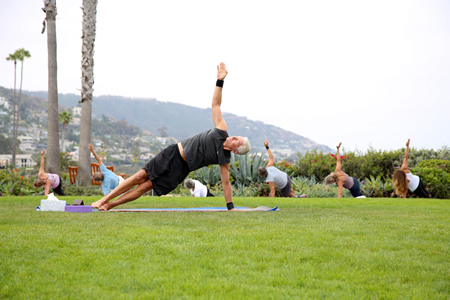By Robin Pierson, Special to the Independent

Five mornings a week, promptly at 8 a.m., Carl Brown, lean and focused, begins his yoga class beneath whatever sky the day has brought in the public park north of Laguna Beach’s Montage resort. For more than seven years, the former communications executive has led free or donation-based classes in local parks. As a result of Brown’s leap from the corporate world to the yoga mat, girls in Nepal are getting an education that they would be hard pressed to afford without him.
It all started when Brown realized he could not touch his toes.
As senior executive in a firm hired to set up satellite communication for companies like CBS and HBO, Brown traveled extensively, internationally and domestically. He was moving around the world, but he wasn’t getting much exercise. After his wife, Linda, commented on the love handles padding his torso, Brown took up running.
Brown lost his breath running a block. Embracing “Positive Addictions,” a 1925 treatise on the physical and mental power of healthy habits, Brown committed to a regime of running consistently, transforming himself into a 40-pound lighter, award-winning marathoner in his age group. But eventually, his joints suffered. At 50, a fourth knee surgery loomed and his flexibility was nil. Brown stepped into his first yoga class and liked it enough to attend a few times a week. At 55, urged into an early retirement when his company was sold and an attractive package was offered, Brown started taking classes daily.
Again, Brown was positively addicted.
To improve his own yoga practice, Brown embarked on a 200-hour teacher-training program. To increase his understanding of how yoga postures impact the body, he studied human anatomy while earning his massage therapist license.
“I was a guy with a lot of time on my hands,” he admits.
As his yoga practice deepened, Brown discovered that the ancient Indian discipline encompassed far more than mastery of physical postures.
Enrolled in a yoga and Buddhist studies certificate program at UC Irvine Extension, Brown learned about asanas, mudras, chakras, bandhas, and that yoga’s ultimate purpose is to focus the mind and experience the divine. Another stepping stone was laid in Brown’s future path when he met fellow student, Arlene Dorius, a Newport Beach psychologist and Buddhism teacher. Through Dorius, Brown learned about the prolific good works of her teacher, Tibetan lama Thrangu Rinpoche, whose projects include schools in Nepal ensuring that Himalayan children receive a quality secular education while retaining their Tibetan Buddhist heritage.
While Brown’s wife, Linda, became a regular student of Dorius’, immersing herself in Buddhism and meditation, Brown started teaching at a local yoga studio and gained a following. When the studio closed, he began holding class outside as a community service. For over a year, Brown lead free classes on the tennis courts at Moulton Meadows.
Beginning in 2008, when “Yoga in the Park” moved to Heisler Park, Brown began accepting donations, receiving $10,000, which he donated to the Friendship Shelter. While he has great respect for the local non-profit that helps people who have suffered homelessness and addiction get back on track, Brown had become increasingly moved by the plight of children in Nepal, especially girls, who often have little access to educational opportunities.
Since 2009, Brown has contributed all of the donations he receives – an average of $10,000 each year – to Thrangu Rinpoche’s Himalayan Children’s Fund, which operates Tara Abbey, a monastery and school for girls in Kathmandu, Nepal.
While he has yet to visit Tara Abbey, Brown is a hero to the 230 girls and women who live at the well kept, colorful monastery sitting on a dusty, rutted street above the chaos of Kathmandu. Last year, donations from his yoga classes were used to cover the educational and living expenses of 12 girls, some of whom Brown is friends with on Facebook. “It’s a connection that’s just neat,” he said.
Occasionally, using public outdoor spaces has not been a ‘walk in the park.’ From the start, the city has received a few complaints about the yogis spreading their mats on public walkways. The latest grumble resulted in a police officer attempting to disband the group, citing a statute prohibiting anyone from lying, kneeling or sitting on a public walkway.
Deputy City Manager Ben Siegel informed the officer about the class’s history of park use and that as long as walkways are not blocked and no business is being conducted, the yogis are free to use the space. “We want everyone to get along and enjoy that park,” Siegel said.
An average of 18 people attend the class that Brown admits is “intense.” His goal is to ensure that each posture presses against his students’ edge and that they are “spent” when they release the pose. “Hard work is not fun,” said Brown who regularly spends an hour on a life cycle getting an aerobic workout before class. “The fun is when it’s done.” Some first timers never return and since it is outside, some “yoga snobs” dismiss it since it is not held in a studio.
Others, like Sandy Weiss, faithfully show up, regardless of the weather. “I love doing it outside,” Weiss said. “The setting and Carl are part of the attraction.” Weiss had attended class on a morning of dense fog and a wet chill. “There was a lesson there for me today; that you have to deal with whatever is,” she said. “I never took off my jacket and I put my hoodie up.”
“You generate heat real fast,” said Brown, who can’t imagine returning to a studio.
“In the park you have all the space in the world, warm sun, cool air, 90 percent of the time. I come to the mat and everything else disappears. It’s me and the postures, a moving meditation.”
Brown leads classes daily except on Fridays and Sundays. For more information visit www.yogainthepark.blogspot.com.




